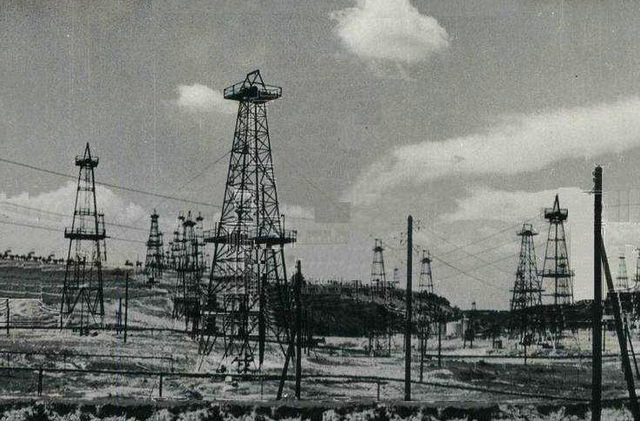Sovrompetrol
The story of one of the most notorious Soviet-Romanian joint enterprises.

Steliu Lambru, 10.03.2014, 13:30
In 1945 Romania took sides with the powers that crushed the Axis Coalition. However, Romania was considered a defeated country, on account of its joining Germany in the Second World War until August 23rd, 1944. The Peace Convention ascribed Romania that particular status, which was all the more relevant in the Convention’s foreword. “The Government and the Higher Command of Romania, acknowledging the defeat of Romania in the war against the Union of Socialist Soviet Republics, the United Kingdom and the United States of America and the other United Nations, has consented to the terms of the armistice as they were laid out by the Governments of the three aforementioned allied Powers, acting in the interest of the United Nations”.
Romania was forced to pay hefty reparations. The payments had to be made in installments, over a six-year period. When it failed to meet a deadline, according to the schedule set by the Allied Control Commission, Romania had to make a monthly extra payment of 5 per cent of its overdue payment. Overall damages accounted for as much as 300 million US Dollars, given that an ounce of gold was traded for 35 Dollars, while the price of Romanian commodities that were to be delivered followed the world standards of 1938, with a 15 per cent increase for rail transport and a 10 per cent increase for other categories. In fact, the price for those goods had gone up by 33 percent as compared to the standard price of 1938. Calculations made back then revealed that the 300 million dollars accounted for more than 55 per cent of Romania’s GDP, which in 1945 stood at 519 million dollars.
Actually, Romania paid a lot more than the double of the reparations that had to be paid as stipulated in the peace treaties. The Soviets were very cunning in finding ways to plunder Romania’s economy, so they set up the joint Sov-rom [Soviet-Romanian] enterprises, in the production sector as well as in the raw material exploitation sectors. Sovrompetrol was the first such enterprise, set up on July 17, 1045. Apart from the railway industry, the oil industry was hit hard by the war. The crude oil production in 1944 stood at an all-time low reported for the Second World War, accounting for 3.52 million tons, that is 63 per cent of the average production of 1941-1944. In order to pay part of its debts, Romania had to deliver the USSR 10, 200,000 tons of crude oil each year.
Maxim Berghianu was the head of what was to become the State Planning Committee. In 2001, when he was interviewed by Romanian Radio’s Oral History center, Berghianu believed that part of the blame for Romania’s being plundered by the Soviets had to be laid on the West. Berghianu revealed that lots of Romanian companies with foreign capital, like the IAR aircraft factory, joined the Sovroms. And oil was part of that as well.
“When the West took the decision to turn us over to Russia, back then they got the best out of it, since these enterprises had foreign capital, and the IAR had been working for the Germans. It was the Messerschmitt aircraft factory that later made tractors. Then there were the Sovroms, then the chemical industry, with many of its venues tailored for weaponry and producing TNT and dynamite. So what we got were Sovrom Tractor, SovromChim, SovromGaz, Sovrompetrol. The Russians penetrated the richest areas, rich in raw material resources, where they thought they were highly likely to make a profit. Not to mention uranium, which they exploited ruthlessly.”
Sovrompetrol, just like other companies of its kind, was a real burden on Romania’s economy, faced with massive shortcomings by the early 1950s. The Romanian communist leaders were very much aware of that, and they started taking measures, as Gheorghe Apostol, advisor to leader Gheorghe Gheorghiu Dej, recounts in 1994:
“Romanian economy was under the USSR’s control through those Sovroms. We were investing in industry, agriculture, in all sectors of the economy, but they would reap all the benefits. At a reception on November 7th, 1952, at the Soviet Embassy, before going to Stalin, Dej summoned us. He wanted to talk to us about a proposal made by the Soviet government to sovromize methane gas too, as they had already done with oil. And Dej said: ‘That’s it! We will not give in any more! This Sovrom issue requires a solution based on mutual agreement, and for that we need to take action. We are now going to the Soviet Embassy. I will pretend to be drinking and I will tell them what we think about these Sovroms.”
It is a well known fact that major decisions are made in informal circumstances and Romanian communists tried to take advantage of that principle too.
“At the end of a reception, the ambassador and his deputies would ask us to join them in a room nearby, where there was also food and drinks, in order to discuss both domestic and international matters. And I recall that meeting, with Dej sitting next to the Soviet Ambassador and the Soviet Government Representative for Sovroms and, suddenly, I heard him say: ‘Comrade, would you please tell me what capital export means?’ And the other one said: ‘What’s the point of this question?’ And Dej replied: ‘We make the investments and you take the benefits’. And this is how the conversation ended.”
Sovroms and Sovrompetrol could only be dismantled after the death of Stalin. The first ones disappeared in 1956, among which Sovrompetrol, after 12 years of functioning, instead of 6, as initially planned. The last sovroms were dismantled in 1959, after 14 years.




























